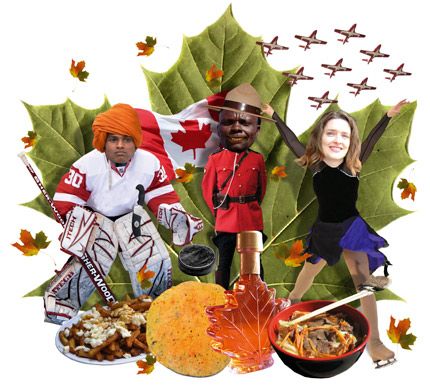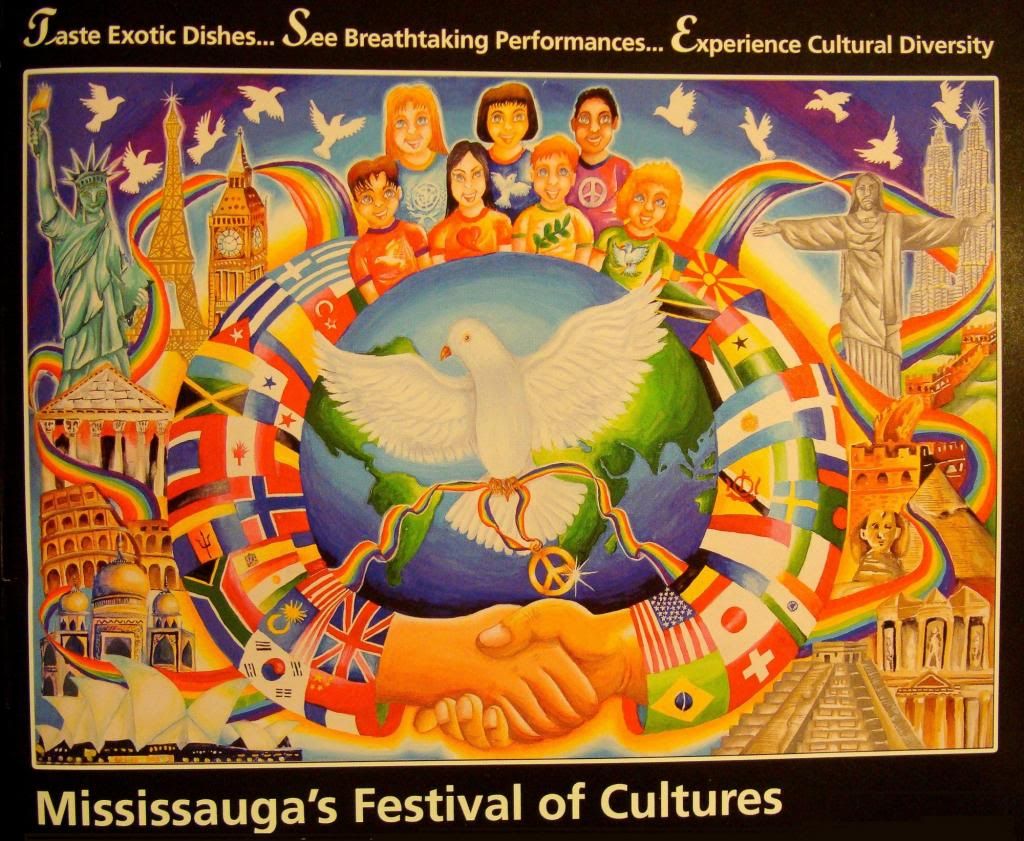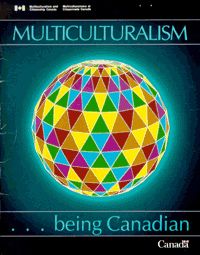The evening we arrived in Toronto, our taxi driver took us on a roundabout route through Forest Hill, a residential district of million-dollar houses, many with the Tudor-ish look of old England. Very passé, though obviously still popular with some of the city's movers and shakers. The driver explained that it was the next-to-last day of the Caribbean Carnival and many streets were blocked off to accommodate the bejewelled and befeathered dancers and bongo pounders, necessitating our detour.
He was a friendly chap and wanted to make us feel good in wonderland. "Our schools have kids who speak 160 languages," he said, and said it with pride, as Canadians do. It struck me as probably an exaggeration, even if you assume he meant lots of different kids rather than a handful who could converse in 160 tongues. Still, with Canada's bid to become the world, maybe it was the simple truth.
He was a friendly chap and wanted to make us feel good in wonderland. "Our schools have kids who speak 160 languages," he said, and said it with pride, as Canadians do. It struck me as probably an exaggeration, even if you assume he meant lots of different kids rather than a handful who could converse in 160 tongues. Still, with Canada's bid to become the world, maybe it was the simple truth.
I guess Toronto is the most multi-cultural city on earth. For variety of ethnicity and national origins it beats even New York. Except for the residue of native-English-speaking occupants, everybody speaks with a foreign accent (even when speaking English, or something resembling it) that has to be quickly analyzed and interpreted by the visitor if any communication at all is to take place.
In most U.S. cities, you grow accustomed to standard American English plus a handful of variants: black speech, latino speech, maybe Asian or something. In Toronto, not only do you constantly encounter foreign accents, but dozens of different ones, in quick succession. You have no sooner adjusted or tried to adjust to one manner of speaking than you are quickly dealing with a different manner. And of course you're constantly surrounded by non-English spoken and written languages.
I cannot say how Torontoans react to this, but for the visitor from a less-advanced country than Canada, one that still has a dominant culture, the psychological effect is peculiar indeed. At the same moment, you could be almost anywhere, but you're nowhere at all in particular.
The locals believe that it works, that they've found the answer to all social ills involving ethnicity. And it's probably true that if multi-culturalism can work anywhere, Canada is that place -- for the following reasons:
1. Canada has a long history of being divided into two cultures, the English and the French. For a while, in the '60s and '70s, it looked like heating up into a moosehead version of the Irish Troubles. But although there's still a wide cultural and political gap between the "two solitudes," a certain amount of common sense has prevailed, mainly because the Québecois get all kinds of financial aid from the federal government. A break-up would put paid to the arrangement so favorable to the French, and the dwindling English population thinks it would be the universe's last day if Québec seceded.
2. I don't know if it applies to French Canada, but English Canada has never had much of an identity. At most it was a watered-down Britishness. Unlike Americans, English Canadians have never been emotionally committed to a historic ideal.
3. English Canadians are mild and polite, like the English English used to be, and don't know how to say no when they should. They've inherited one of the less attractive traits of the British, deference to superiors (whether government bureaucrats or immigrants). They quickly learn the party line and are happy to regurgitate it.
Learning what is expected of a good Multi Cultist is made much easier by The Globe and Mail, which bills itself as "Canada's National Newspaper." Its political correctness reaches comical heights, and it encourages (perhaps requires) the same in readers who send letters to the editor. Herewith, a published letter urging the establishment of a national holiday to be called "Multiculturalism Day":
The question is, what lies under the surface? Genuine acceptance and goodwill, or surrender to government repression?
A country whose people have the benevolent feelings toward one another that the international and inter-racial cheerleaders insist will be the fruits of their policies would not need a Human Rights Commission or Tribunal. Smooth relationships among all the groups would come about naturally and organically -- if the population replacers are right. We'll see about that "if."
2. I don't know if it applies to French Canada, but English Canada has never had much of an identity. At most it was a watered-down Britishness. Unlike Americans, English Canadians have never been emotionally committed to a historic ideal.
3. English Canadians are mild and polite, like the English English used to be, and don't know how to say no when they should. They've inherited one of the less attractive traits of the British, deference to superiors (whether government bureaucrats or immigrants). They quickly learn the party line and are happy to regurgitate it.
Few of us have a single culture in our families any more and even less of us will have them going into the future. We're not just seeing records broken in the number of immigrants but in the scope of their national origins, and I think that is something to be proud of. More than anything else, I see Canadians as a patchwork, it's getting more intricate by the day and that comes from celebrating each other.I saw no evidence of Canadians celebrating each other; what I observed was each ethnic group celebrating itself and white Canadians celebrating everyone other than themselves. It appears that there is little overt friction between the patches referred to by the correspondent. As far as I could determine, Canada and even Toronto lack the constant background of racial violence that Americans enjoy. On the surface, calm reigns.
The question is, what lies under the surface? Genuine acceptance and goodwill, or surrender to government repression?
Toronto has a subway system, whose virtues (like those of the Washington Metro) are that it is less filthy than New York's and it moves masses of people squeezed together. James Howard Kunstler would love it, since it strikes a blow for high density against the horrors of suburbs.
At the station entrance nearest our hotel, and doubtless at all stations, there is a notice from both the Human Rights Commission and the Human Rights Tribunal (tribunal! Hello, Citizen Robespierre!). It spells out the usual multi-cultural boilerplate, about all people being entitled to respect and freedom from offense regardless of race, religion, sexual orientation, previous condition of servitude, hair color, sports team supported, etc. Anyone with an IQ in triple digits understands the code, though: if you offend an immigrant or member of the "First Nations" (those who used to be called Eskimos in the bad old racist days) your life will be made miserable from then on by the Commission and Tribunal and various other enforcers.
At the moment Toronto is in the sweet spot. It seems prosperous, and many of the immigrants are new enough that they haven't had time to learn how to game the system to their advantage. Currently the signs are in English and French; what happens when the Middle Eastern Muslims demand that they be in Arabic? When the Chinese and Koreans demand their own schools? When Africans want state-supported African community centers? Check back in 10 or 15 years before concluding that Canada's diversicrats have squared the circle.
A country whose people have the benevolent feelings toward one another that the international and inter-racial cheerleaders insist will be the fruits of their policies would not need a Human Rights Commission or Tribunal. Smooth relationships among all the groups would come about naturally and organically -- if the population replacers are right. We'll see about that "if."







6 comments:
I just spent four days in Saint John, New Brunswick. The maritime provinces seem to currently be spared the diversification of Canada. I have to say that the entire experience gave me a warm feeling...until I heard CBC radio but you can't have it all. New Brunswick, Nova Scotia and Newfoundland may be the last bastion of "Old Canada". I was impressed with the people.
What's interesting for Canada's future is it's West.
Vancouver has gotten the nickname ''Hongcouver'' due to the large influx of newly-wealthy Chinese. Nor do I blame them, as you are likely aware China is careening towards a crisis of debt and development that is unsustainable, and those in China that can are fleeing what could well be the next ''cultural revolution'' a term that for good reason would make anyone's blood run cold.
Your mention of Kunstler reminded me of something I saw recently, rather than copy it over I'll just link it. The gist is what might happen when (relatively) cheap, plentiful energy ends. I think he's correct in his assessment that the US will go through a hell as terrible as the Civil War.
Canada will likely be spared such a hell due to the fact that electrical generation and other sources of energy are plentiful there. In fact if Quebec ever were to go it's own way it would be quite viable by selling it's plentiful hydroelectric power both to the rest of Canada as well as the northeast US. Though I doubt it would ever happen, Quebec has settled into a Puerto Rico-like situation where independence regularly gets put to a vote and solidly voted down.
Rich Hill,
I imagine New Brunswick to be attractive in some ways -- not yet overdeveloped, somewhat traditional, and as you say mostly native British and French families. But I'd be stone bored after a few days, and the winters don't bear thinking on.
YIH,
Didn't Mark Twain say something to the effect that prediction is easy, except about the future? Kunstler's vision of economic Götterdämmerung might come to pass -- who can deny the possibility? But by and large our country is pretty good at dealing with technical problems such as energy sources.
The social and political problems worry me a lot more. We are far more likely to run out of personal freedom than oil or electricity.
" I'd be stone bored after a few days, and the winters don't bear thinking on."
It's a simpler way of life for sure but isn't that the antithesis of modernity?
Rich,
Yes, you could call it the antithesis of modernity. Some things about modern life I like, some I don't like. It's important to know oneself, and try to find an appropriate environment. The choice will always be a compromise, but some compromises are better than others.
I did actually visit New Brunswick, Nova Scotia, and PEI on a family trip when I was a kid, a long time ago. Nowadays I expect I'd enjoy a brief visit, but frankly, with a limited amount of time left in this incarnation and no great amount of money for travel, the Atlantic Provinces are pretty low on my list of hoped-for destinations.
there is no any doubt that Canada is multicultural country and basically Toronto Ontario is one of the big city who have a great role as cultural city and as i am also a driver from airport taxi toronto u can say that Canada succeeded as a mulch-cultural country.
Post a Comment